The Effect of Organizational Culture on Employee Talent in Tesco UK
VerifiedAdded on 2022/12/01
|14
|3818
|423
Report
AI Summary
This research proposal investigates the relationship between talent management and organizational culture within Tesco UK. It begins with an introduction and problem statement highlighting employee morale issues and lack of talent management. The academic rationale emphasizes the need for research in this area, particularly addressing the effects of organizational culture on talent management within Tesco UK. The research questions focus on the connection between talent management and organizational culture. The objectives aim to explore the conceptual understanding of talent management and organizational culture, address the effects of culture on managing employee talent in Tesco UK, and recommend ways to strengthen organizational culture. The literature review covers key concepts and findings related to talent management and organizational culture. The research methodology section details the interpretivism research philosophy, inductive research approach, mixed research design, and survey strategy. The survey will be conducted using questionnaires to collect data and analyze the perceptions and opinions of research candidates regarding the effect of organizational culture on managing employee talent in Tesco. Ethical considerations and research limitations are also addressed. The proposal concludes with a list of references.
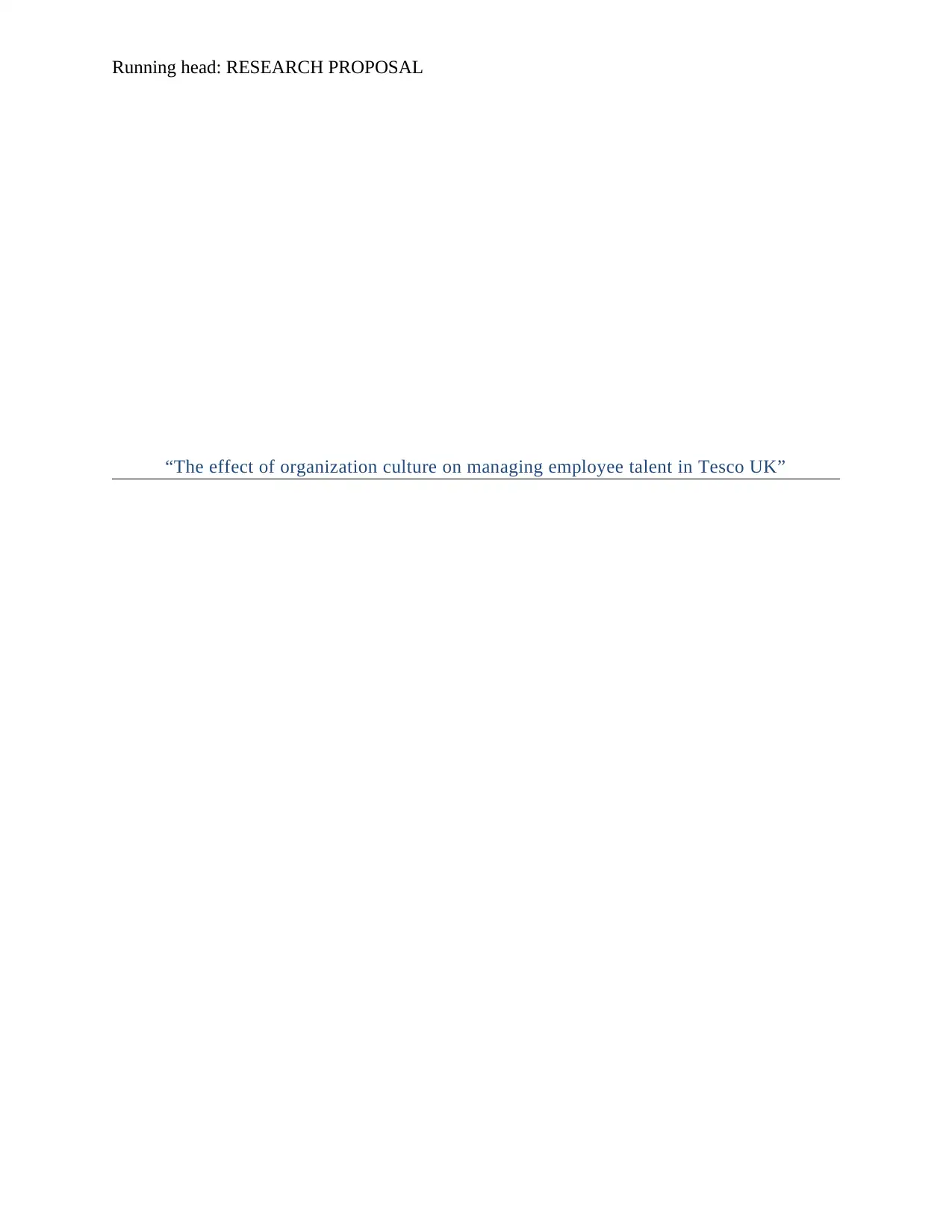
Running head: RESEARCH PROPOSAL
“The effect of organization culture on managing employee talent in Tesco UK”
“The effect of organization culture on managing employee talent in Tesco UK”
Paraphrase This Document
Need a fresh take? Get an instant paraphrase of this document with our AI Paraphraser
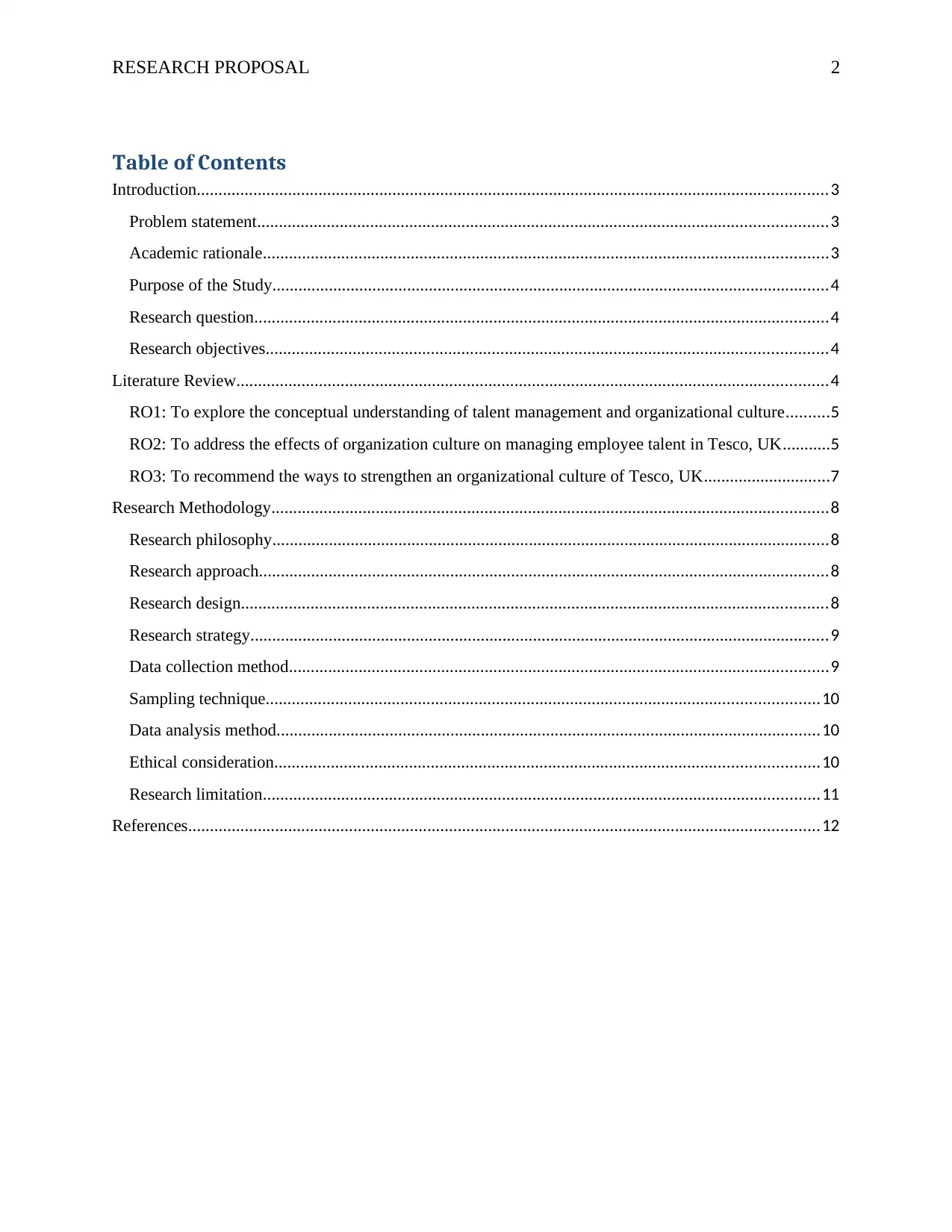
RESEARCH PROPOSAL 2
Table of Contents
Introduction.................................................................................................................................................3
Problem statement...................................................................................................................................3
Academic rationale..................................................................................................................................3
Purpose of the Study................................................................................................................................4
Research question....................................................................................................................................4
Research objectives.................................................................................................................................4
Literature Review........................................................................................................................................4
RO1: To explore the conceptual understanding of talent management and organizational culture..........5
RO2: To address the effects of organization culture on managing employee talent in Tesco, UK...........5
RO3: To recommend the ways to strengthen an organizational culture of Tesco, UK.............................7
Research Methodology................................................................................................................................8
Research philosophy................................................................................................................................8
Research approach...................................................................................................................................8
Research design.......................................................................................................................................8
Research strategy.....................................................................................................................................9
Data collection method............................................................................................................................9
Sampling technique...............................................................................................................................10
Data analysis method.............................................................................................................................10
Ethical consideration.............................................................................................................................10
Research limitation................................................................................................................................11
References.................................................................................................................................................12
Table of Contents
Introduction.................................................................................................................................................3
Problem statement...................................................................................................................................3
Academic rationale..................................................................................................................................3
Purpose of the Study................................................................................................................................4
Research question....................................................................................................................................4
Research objectives.................................................................................................................................4
Literature Review........................................................................................................................................4
RO1: To explore the conceptual understanding of talent management and organizational culture..........5
RO2: To address the effects of organization culture on managing employee talent in Tesco, UK...........5
RO3: To recommend the ways to strengthen an organizational culture of Tesco, UK.............................7
Research Methodology................................................................................................................................8
Research philosophy................................................................................................................................8
Research approach...................................................................................................................................8
Research design.......................................................................................................................................8
Research strategy.....................................................................................................................................9
Data collection method............................................................................................................................9
Sampling technique...............................................................................................................................10
Data analysis method.............................................................................................................................10
Ethical consideration.............................................................................................................................10
Research limitation................................................................................................................................11
References.................................................................................................................................................12
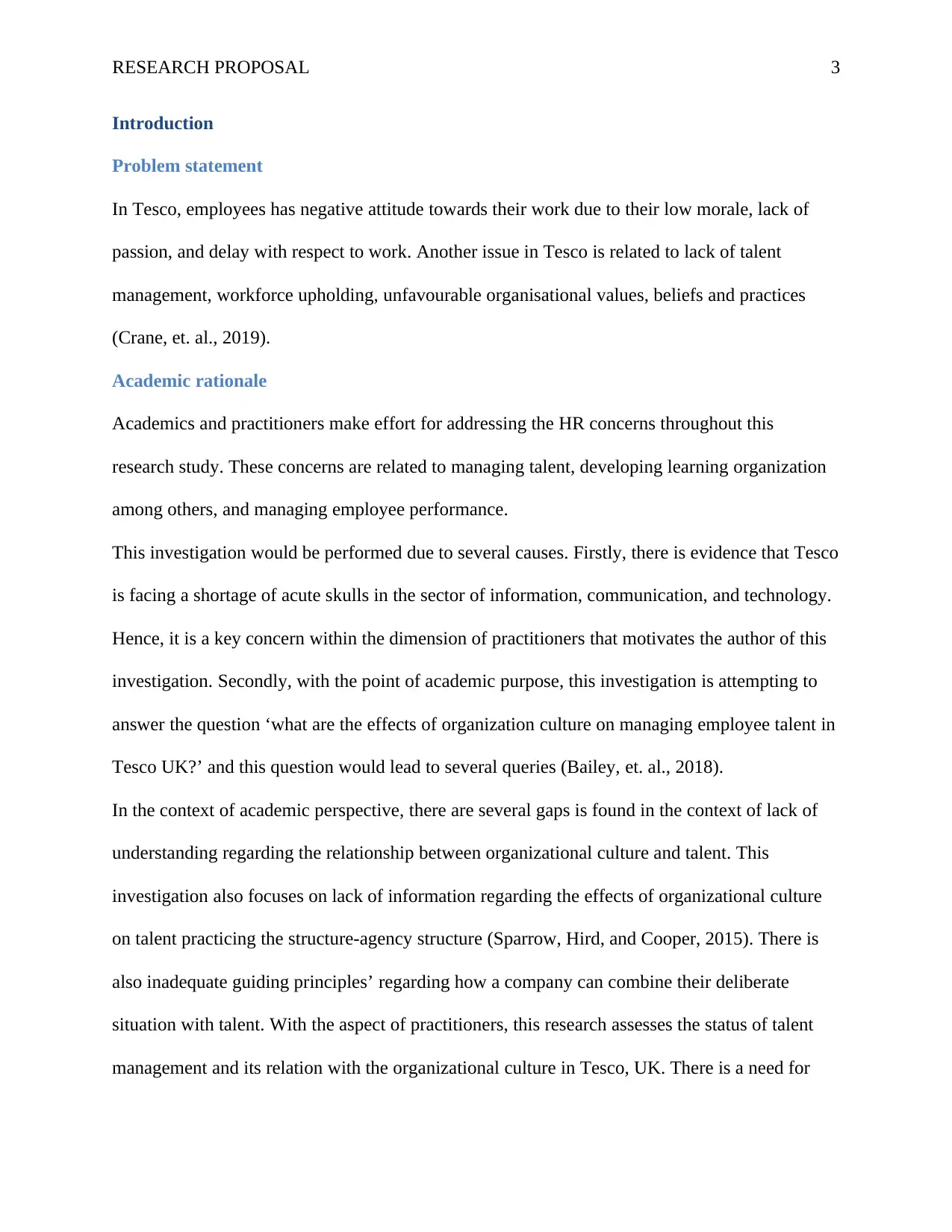
RESEARCH PROPOSAL 3
Introduction
Problem statement
In Tesco, employees has negative attitude towards their work due to their low morale, lack of
passion, and delay with respect to work. Another issue in Tesco is related to lack of talent
management, workforce upholding, unfavourable organisational values, beliefs and practices
(Crane, et. al., 2019).
Academic rationale
Academics and practitioners make effort for addressing the HR concerns throughout this
research study. These concerns are related to managing talent, developing learning organization
among others, and managing employee performance.
This investigation would be performed due to several causes. Firstly, there is evidence that Tesco
is facing a shortage of acute skulls in the sector of information, communication, and technology.
Hence, it is a key concern within the dimension of practitioners that motivates the author of this
investigation. Secondly, with the point of academic purpose, this investigation is attempting to
answer the question ‘what are the effects of organization culture on managing employee talent in
Tesco UK?’ and this question would lead to several queries (Bailey, et. al., 2018).
In the context of academic perspective, there are several gaps is found in the context of lack of
understanding regarding the relationship between organizational culture and talent. This
investigation also focuses on lack of information regarding the effects of organizational culture
on talent practicing the structure-agency structure (Sparrow, Hird, and Cooper, 2015). There is
also inadequate guiding principles’ regarding how a company can combine their deliberate
situation with talent. With the aspect of practitioners, this research assesses the status of talent
management and its relation with the organizational culture in Tesco, UK. There is a need for
Introduction
Problem statement
In Tesco, employees has negative attitude towards their work due to their low morale, lack of
passion, and delay with respect to work. Another issue in Tesco is related to lack of talent
management, workforce upholding, unfavourable organisational values, beliefs and practices
(Crane, et. al., 2019).
Academic rationale
Academics and practitioners make effort for addressing the HR concerns throughout this
research study. These concerns are related to managing talent, developing learning organization
among others, and managing employee performance.
This investigation would be performed due to several causes. Firstly, there is evidence that Tesco
is facing a shortage of acute skulls in the sector of information, communication, and technology.
Hence, it is a key concern within the dimension of practitioners that motivates the author of this
investigation. Secondly, with the point of academic purpose, this investigation is attempting to
answer the question ‘what are the effects of organization culture on managing employee talent in
Tesco UK?’ and this question would lead to several queries (Bailey, et. al., 2018).
In the context of academic perspective, there are several gaps is found in the context of lack of
understanding regarding the relationship between organizational culture and talent. This
investigation also focuses on lack of information regarding the effects of organizational culture
on talent practicing the structure-agency structure (Sparrow, Hird, and Cooper, 2015). There is
also inadequate guiding principles’ regarding how a company can combine their deliberate
situation with talent. With the aspect of practitioners, this research assesses the status of talent
management and its relation with the organizational culture in Tesco, UK. There is a need for
⊘ This is a preview!⊘
Do you want full access?
Subscribe today to unlock all pages.

Trusted by 1+ million students worldwide
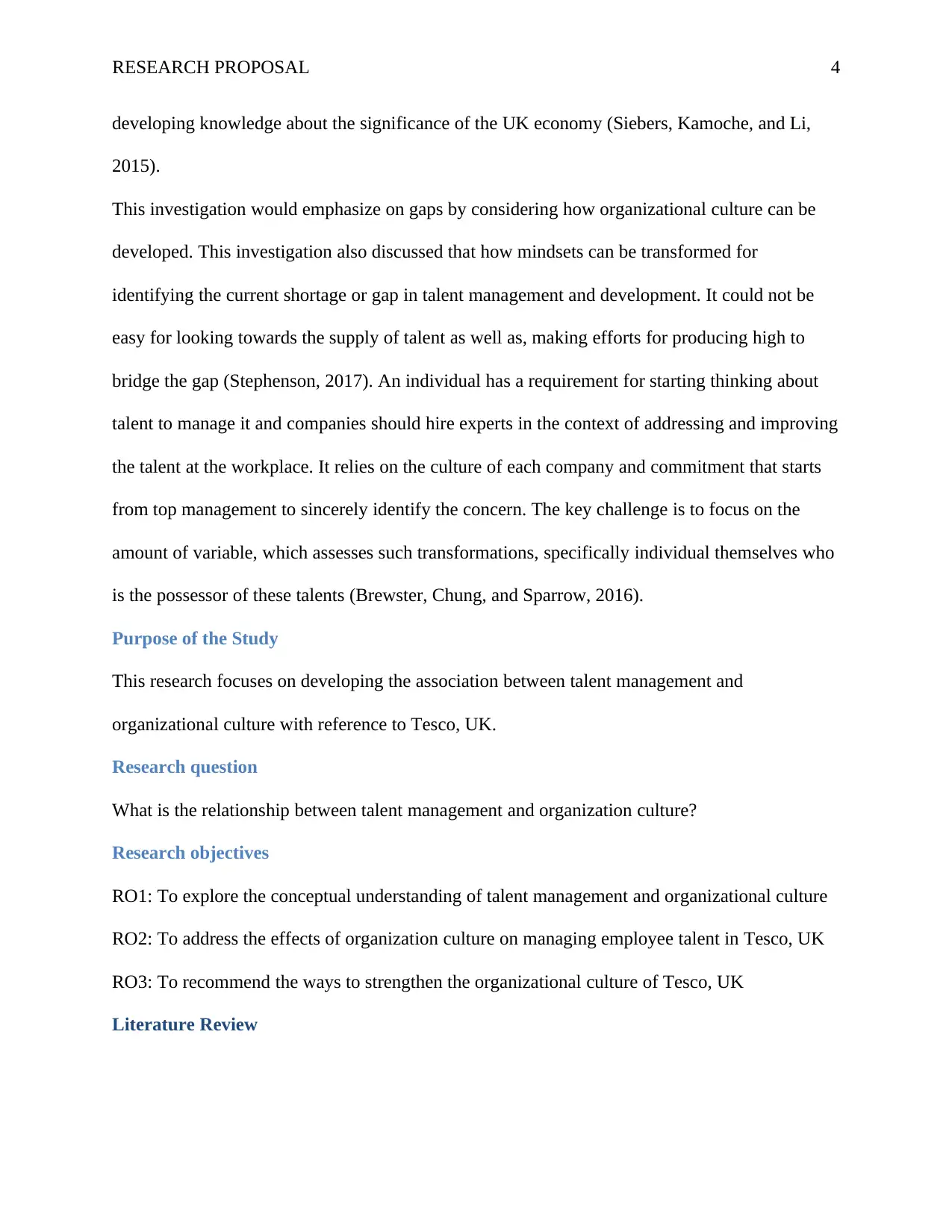
RESEARCH PROPOSAL 4
developing knowledge about the significance of the UK economy (Siebers, Kamoche, and Li,
2015).
This investigation would emphasize on gaps by considering how organizational culture can be
developed. This investigation also discussed that how mindsets can be transformed for
identifying the current shortage or gap in talent management and development. It could not be
easy for looking towards the supply of talent as well as, making efforts for producing high to
bridge the gap (Stephenson, 2017). An individual has a requirement for starting thinking about
talent to manage it and companies should hire experts in the context of addressing and improving
the talent at the workplace. It relies on the culture of each company and commitment that starts
from top management to sincerely identify the concern. The key challenge is to focus on the
amount of variable, which assesses such transformations, specifically individual themselves who
is the possessor of these talents (Brewster, Chung, and Sparrow, 2016).
Purpose of the Study
This research focuses on developing the association between talent management and
organizational culture with reference to Tesco, UK.
Research question
What is the relationship between talent management and organization culture?
Research objectives
RO1: To explore the conceptual understanding of talent management and organizational culture
RO2: To address the effects of organization culture on managing employee talent in Tesco, UK
RO3: To recommend the ways to strengthen the organizational culture of Tesco, UK
Literature Review
developing knowledge about the significance of the UK economy (Siebers, Kamoche, and Li,
2015).
This investigation would emphasize on gaps by considering how organizational culture can be
developed. This investigation also discussed that how mindsets can be transformed for
identifying the current shortage or gap in talent management and development. It could not be
easy for looking towards the supply of talent as well as, making efforts for producing high to
bridge the gap (Stephenson, 2017). An individual has a requirement for starting thinking about
talent to manage it and companies should hire experts in the context of addressing and improving
the talent at the workplace. It relies on the culture of each company and commitment that starts
from top management to sincerely identify the concern. The key challenge is to focus on the
amount of variable, which assesses such transformations, specifically individual themselves who
is the possessor of these talents (Brewster, Chung, and Sparrow, 2016).
Purpose of the Study
This research focuses on developing the association between talent management and
organizational culture with reference to Tesco, UK.
Research question
What is the relationship between talent management and organization culture?
Research objectives
RO1: To explore the conceptual understanding of talent management and organizational culture
RO2: To address the effects of organization culture on managing employee talent in Tesco, UK
RO3: To recommend the ways to strengthen the organizational culture of Tesco, UK
Literature Review
Paraphrase This Document
Need a fresh take? Get an instant paraphrase of this document with our AI Paraphraser
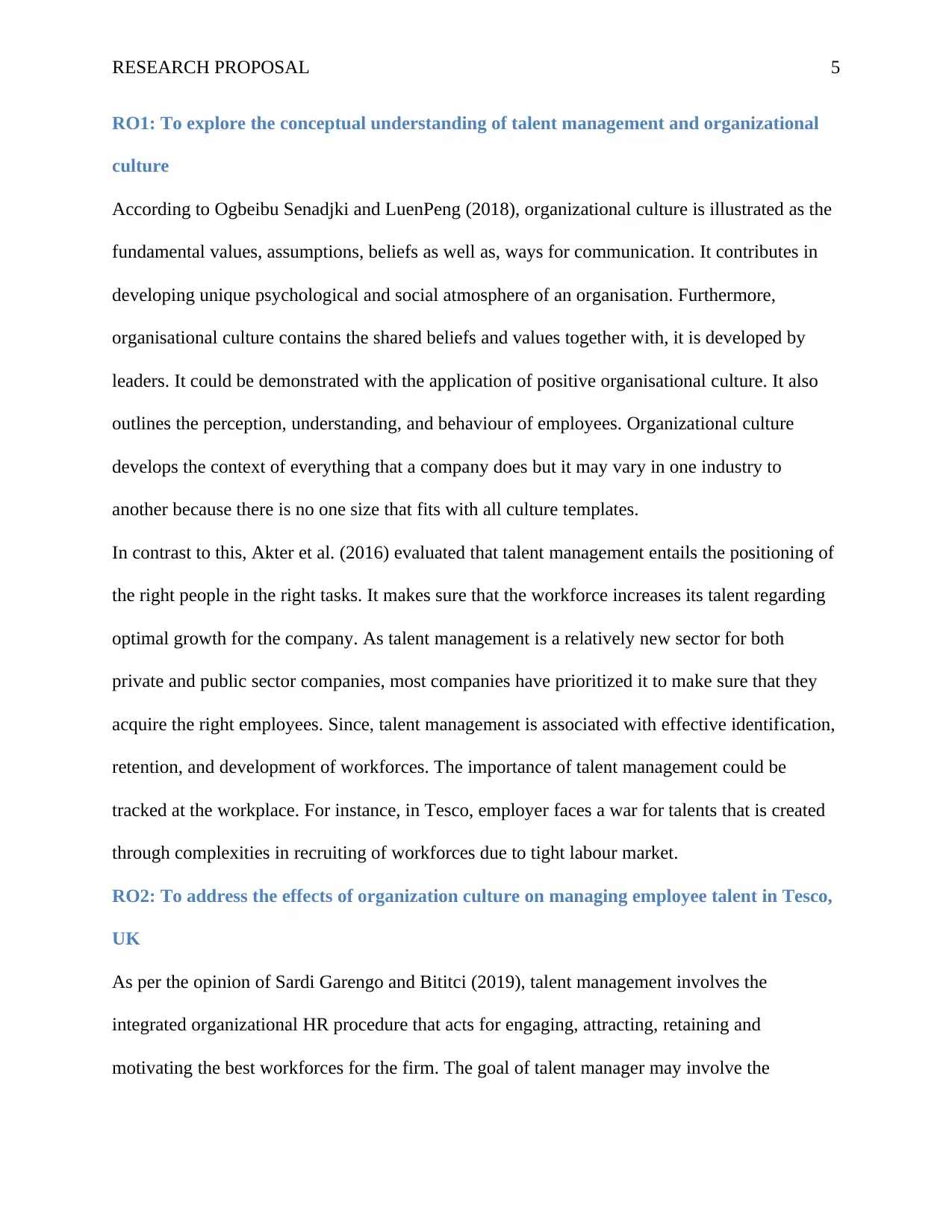
RESEARCH PROPOSAL 5
RO1: To explore the conceptual understanding of talent management and organizational
culture
According to Ogbeibu Senadjki and LuenPeng (2018), organizational culture is illustrated as the
fundamental values, assumptions, beliefs as well as, ways for communication. It contributes in
developing unique psychological and social atmosphere of an organisation. Furthermore,
organisational culture contains the shared beliefs and values together with, it is developed by
leaders. It could be demonstrated with the application of positive organisational culture. It also
outlines the perception, understanding, and behaviour of employees. Organizational culture
develops the context of everything that a company does but it may vary in one industry to
another because there is no one size that fits with all culture templates.
In contrast to this, Akter et al. (2016) evaluated that talent management entails the positioning of
the right people in the right tasks. It makes sure that the workforce increases its talent regarding
optimal growth for the company. As talent management is a relatively new sector for both
private and public sector companies, most companies have prioritized it to make sure that they
acquire the right employees. Since, talent management is associated with effective identification,
retention, and development of workforces. The importance of talent management could be
tracked at the workplace. For instance, in Tesco, employer faces a war for talents that is created
through complexities in recruiting of workforces due to tight labour market.
RO2: To address the effects of organization culture on managing employee talent in Tesco,
UK
As per the opinion of Sardi Garengo and Bititci (2019), talent management involves the
integrated organizational HR procedure that acts for engaging, attracting, retaining and
motivating the best workforces for the firm. The goal of talent manager may involve the
RO1: To explore the conceptual understanding of talent management and organizational
culture
According to Ogbeibu Senadjki and LuenPeng (2018), organizational culture is illustrated as the
fundamental values, assumptions, beliefs as well as, ways for communication. It contributes in
developing unique psychological and social atmosphere of an organisation. Furthermore,
organisational culture contains the shared beliefs and values together with, it is developed by
leaders. It could be demonstrated with the application of positive organisational culture. It also
outlines the perception, understanding, and behaviour of employees. Organizational culture
develops the context of everything that a company does but it may vary in one industry to
another because there is no one size that fits with all culture templates.
In contrast to this, Akter et al. (2016) evaluated that talent management entails the positioning of
the right people in the right tasks. It makes sure that the workforce increases its talent regarding
optimal growth for the company. As talent management is a relatively new sector for both
private and public sector companies, most companies have prioritized it to make sure that they
acquire the right employees. Since, talent management is associated with effective identification,
retention, and development of workforces. The importance of talent management could be
tracked at the workplace. For instance, in Tesco, employer faces a war for talents that is created
through complexities in recruiting of workforces due to tight labour market.
RO2: To address the effects of organization culture on managing employee talent in Tesco,
UK
As per the opinion of Sardi Garengo and Bititci (2019), talent management involves the
integrated organizational HR procedure that acts for engaging, attracting, retaining and
motivating the best workforces for the firm. The goal of talent manager may involve the
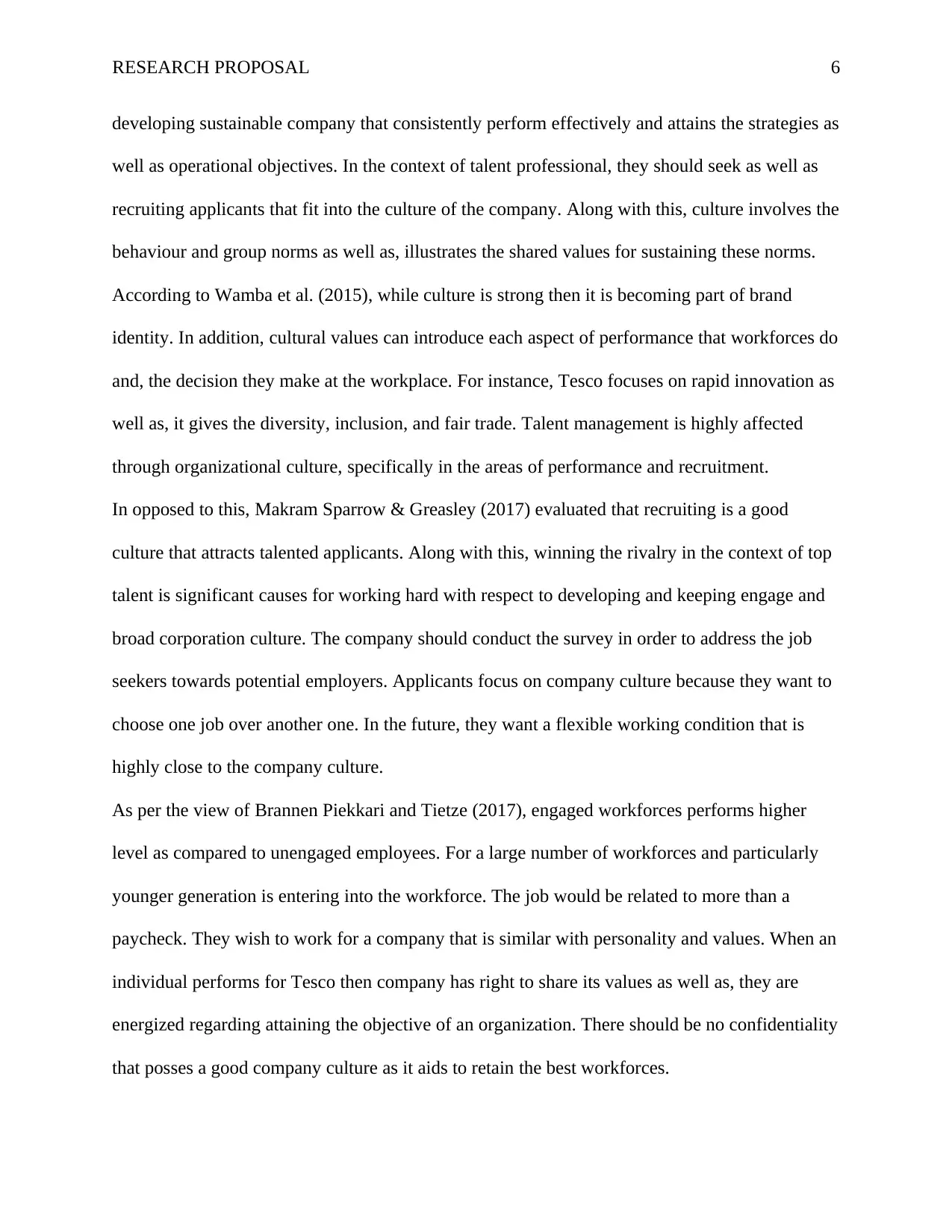
RESEARCH PROPOSAL 6
developing sustainable company that consistently perform effectively and attains the strategies as
well as operational objectives. In the context of talent professional, they should seek as well as
recruiting applicants that fit into the culture of the company. Along with this, culture involves the
behaviour and group norms as well as, illustrates the shared values for sustaining these norms.
According to Wamba et al. (2015), while culture is strong then it is becoming part of brand
identity. In addition, cultural values can introduce each aspect of performance that workforces do
and, the decision they make at the workplace. For instance, Tesco focuses on rapid innovation as
well as, it gives the diversity, inclusion, and fair trade. Talent management is highly affected
through organizational culture, specifically in the areas of performance and recruitment.
In opposed to this, Makram Sparrow & Greasley (2017) evaluated that recruiting is a good
culture that attracts talented applicants. Along with this, winning the rivalry in the context of top
talent is significant causes for working hard with respect to developing and keeping engage and
broad corporation culture. The company should conduct the survey in order to address the job
seekers towards potential employers. Applicants focus on company culture because they want to
choose one job over another one. In the future, they want a flexible working condition that is
highly close to the company culture.
As per the view of Brannen Piekkari and Tietze (2017), engaged workforces performs higher
level as compared to unengaged employees. For a large number of workforces and particularly
younger generation is entering into the workforce. The job would be related to more than a
paycheck. They wish to work for a company that is similar with personality and values. When an
individual performs for Tesco then company has right to share its values as well as, they are
energized regarding attaining the objective of an organization. There should be no confidentiality
that posses a good company culture as it aids to retain the best workforces.
developing sustainable company that consistently perform effectively and attains the strategies as
well as operational objectives. In the context of talent professional, they should seek as well as
recruiting applicants that fit into the culture of the company. Along with this, culture involves the
behaviour and group norms as well as, illustrates the shared values for sustaining these norms.
According to Wamba et al. (2015), while culture is strong then it is becoming part of brand
identity. In addition, cultural values can introduce each aspect of performance that workforces do
and, the decision they make at the workplace. For instance, Tesco focuses on rapid innovation as
well as, it gives the diversity, inclusion, and fair trade. Talent management is highly affected
through organizational culture, specifically in the areas of performance and recruitment.
In opposed to this, Makram Sparrow & Greasley (2017) evaluated that recruiting is a good
culture that attracts talented applicants. Along with this, winning the rivalry in the context of top
talent is significant causes for working hard with respect to developing and keeping engage and
broad corporation culture. The company should conduct the survey in order to address the job
seekers towards potential employers. Applicants focus on company culture because they want to
choose one job over another one. In the future, they want a flexible working condition that is
highly close to the company culture.
As per the view of Brannen Piekkari and Tietze (2017), engaged workforces performs higher
level as compared to unengaged employees. For a large number of workforces and particularly
younger generation is entering into the workforce. The job would be related to more than a
paycheck. They wish to work for a company that is similar with personality and values. When an
individual performs for Tesco then company has right to share its values as well as, they are
energized regarding attaining the objective of an organization. There should be no confidentiality
that posses a good company culture as it aids to retain the best workforces.
⊘ This is a preview!⊘
Do you want full access?
Subscribe today to unlock all pages.

Trusted by 1+ million students worldwide
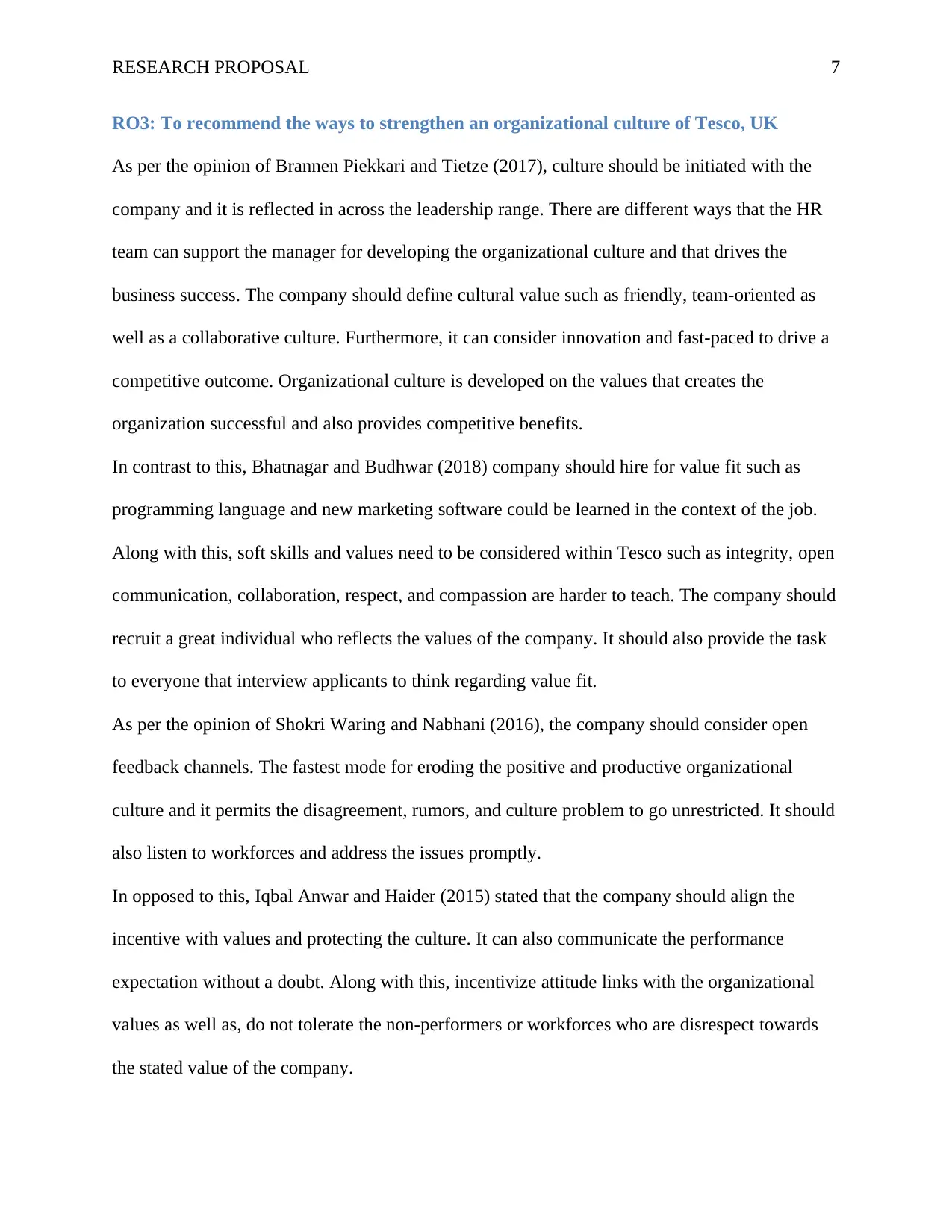
RESEARCH PROPOSAL 7
RO3: To recommend the ways to strengthen an organizational culture of Tesco, UK
As per the opinion of Brannen Piekkari and Tietze (2017), culture should be initiated with the
company and it is reflected in across the leadership range. There are different ways that the HR
team can support the manager for developing the organizational culture and that drives the
business success. The company should define cultural value such as friendly, team-oriented as
well as a collaborative culture. Furthermore, it can consider innovation and fast-paced to drive a
competitive outcome. Organizational culture is developed on the values that creates the
organization successful and also provides competitive benefits.
In contrast to this, Bhatnagar and Budhwar (2018) company should hire for value fit such as
programming language and new marketing software could be learned in the context of the job.
Along with this, soft skills and values need to be considered within Tesco such as integrity, open
communication, collaboration, respect, and compassion are harder to teach. The company should
recruit a great individual who reflects the values of the company. It should also provide the task
to everyone that interview applicants to think regarding value fit.
As per the opinion of Shokri Waring and Nabhani (2016), the company should consider open
feedback channels. The fastest mode for eroding the positive and productive organizational
culture and it permits the disagreement, rumors, and culture problem to go unrestricted. It should
also listen to workforces and address the issues promptly.
In opposed to this, Iqbal Anwar and Haider (2015) stated that the company should align the
incentive with values and protecting the culture. It can also communicate the performance
expectation without a doubt. Along with this, incentivize attitude links with the organizational
values as well as, do not tolerate the non-performers or workforces who are disrespect towards
the stated value of the company.
RO3: To recommend the ways to strengthen an organizational culture of Tesco, UK
As per the opinion of Brannen Piekkari and Tietze (2017), culture should be initiated with the
company and it is reflected in across the leadership range. There are different ways that the HR
team can support the manager for developing the organizational culture and that drives the
business success. The company should define cultural value such as friendly, team-oriented as
well as a collaborative culture. Furthermore, it can consider innovation and fast-paced to drive a
competitive outcome. Organizational culture is developed on the values that creates the
organization successful and also provides competitive benefits.
In contrast to this, Bhatnagar and Budhwar (2018) company should hire for value fit such as
programming language and new marketing software could be learned in the context of the job.
Along with this, soft skills and values need to be considered within Tesco such as integrity, open
communication, collaboration, respect, and compassion are harder to teach. The company should
recruit a great individual who reflects the values of the company. It should also provide the task
to everyone that interview applicants to think regarding value fit.
As per the opinion of Shokri Waring and Nabhani (2016), the company should consider open
feedback channels. The fastest mode for eroding the positive and productive organizational
culture and it permits the disagreement, rumors, and culture problem to go unrestricted. It should
also listen to workforces and address the issues promptly.
In opposed to this, Iqbal Anwar and Haider (2015) stated that the company should align the
incentive with values and protecting the culture. It can also communicate the performance
expectation without a doubt. Along with this, incentivize attitude links with the organizational
values as well as, do not tolerate the non-performers or workforces who are disrespect towards
the stated value of the company.
Paraphrase This Document
Need a fresh take? Get an instant paraphrase of this document with our AI Paraphraser
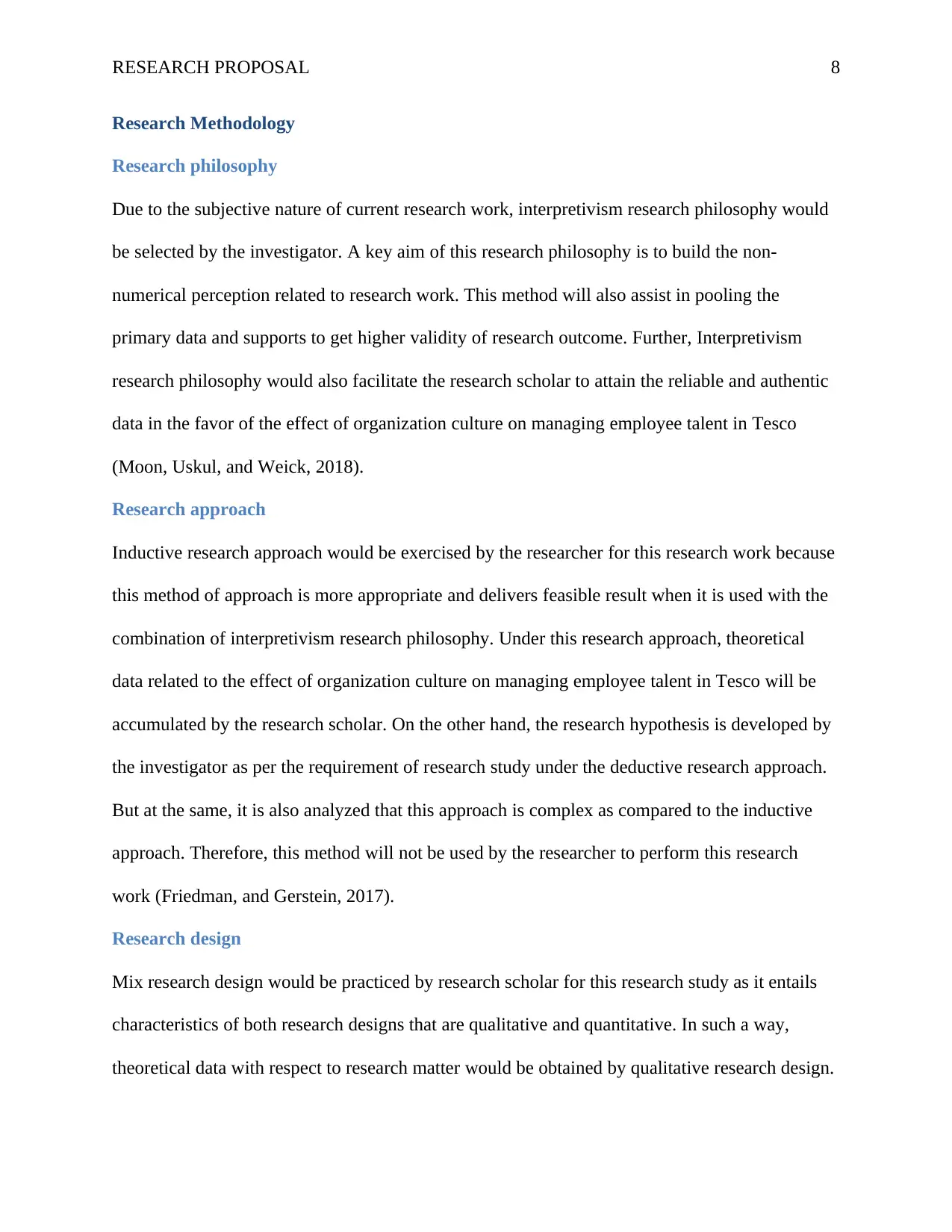
RESEARCH PROPOSAL 8
Research Methodology
Research philosophy
Due to the subjective nature of current research work, interpretivism research philosophy would
be selected by the investigator. A key aim of this research philosophy is to build the non-
numerical perception related to research work. This method will also assist in pooling the
primary data and supports to get higher validity of research outcome. Further, Interpretivism
research philosophy would also facilitate the research scholar to attain the reliable and authentic
data in the favor of the effect of organization culture on managing employee talent in Tesco
(Moon, Uskul, and Weick, 2018).
Research approach
Inductive research approach would be exercised by the researcher for this research work because
this method of approach is more appropriate and delivers feasible result when it is used with the
combination of interpretivism research philosophy. Under this research approach, theoretical
data related to the effect of organization culture on managing employee talent in Tesco will be
accumulated by the research scholar. On the other hand, the research hypothesis is developed by
the investigator as per the requirement of research study under the deductive research approach.
But at the same, it is also analyzed that this approach is complex as compared to the inductive
approach. Therefore, this method will not be used by the researcher to perform this research
work (Friedman, and Gerstein, 2017).
Research design
Mix research design would be practiced by research scholar for this research study as it entails
characteristics of both research designs that are qualitative and quantitative. In such a way,
theoretical data with respect to research matter would be obtained by qualitative research design.
Research Methodology
Research philosophy
Due to the subjective nature of current research work, interpretivism research philosophy would
be selected by the investigator. A key aim of this research philosophy is to build the non-
numerical perception related to research work. This method will also assist in pooling the
primary data and supports to get higher validity of research outcome. Further, Interpretivism
research philosophy would also facilitate the research scholar to attain the reliable and authentic
data in the favor of the effect of organization culture on managing employee talent in Tesco
(Moon, Uskul, and Weick, 2018).
Research approach
Inductive research approach would be exercised by the researcher for this research work because
this method of approach is more appropriate and delivers feasible result when it is used with the
combination of interpretivism research philosophy. Under this research approach, theoretical
data related to the effect of organization culture on managing employee talent in Tesco will be
accumulated by the research scholar. On the other hand, the research hypothesis is developed by
the investigator as per the requirement of research study under the deductive research approach.
But at the same, it is also analyzed that this approach is complex as compared to the inductive
approach. Therefore, this method will not be used by the researcher to perform this research
work (Friedman, and Gerstein, 2017).
Research design
Mix research design would be practiced by research scholar for this research study as it entails
characteristics of both research designs that are qualitative and quantitative. In such a way,
theoretical data with respect to research matter would be obtained by qualitative research design.
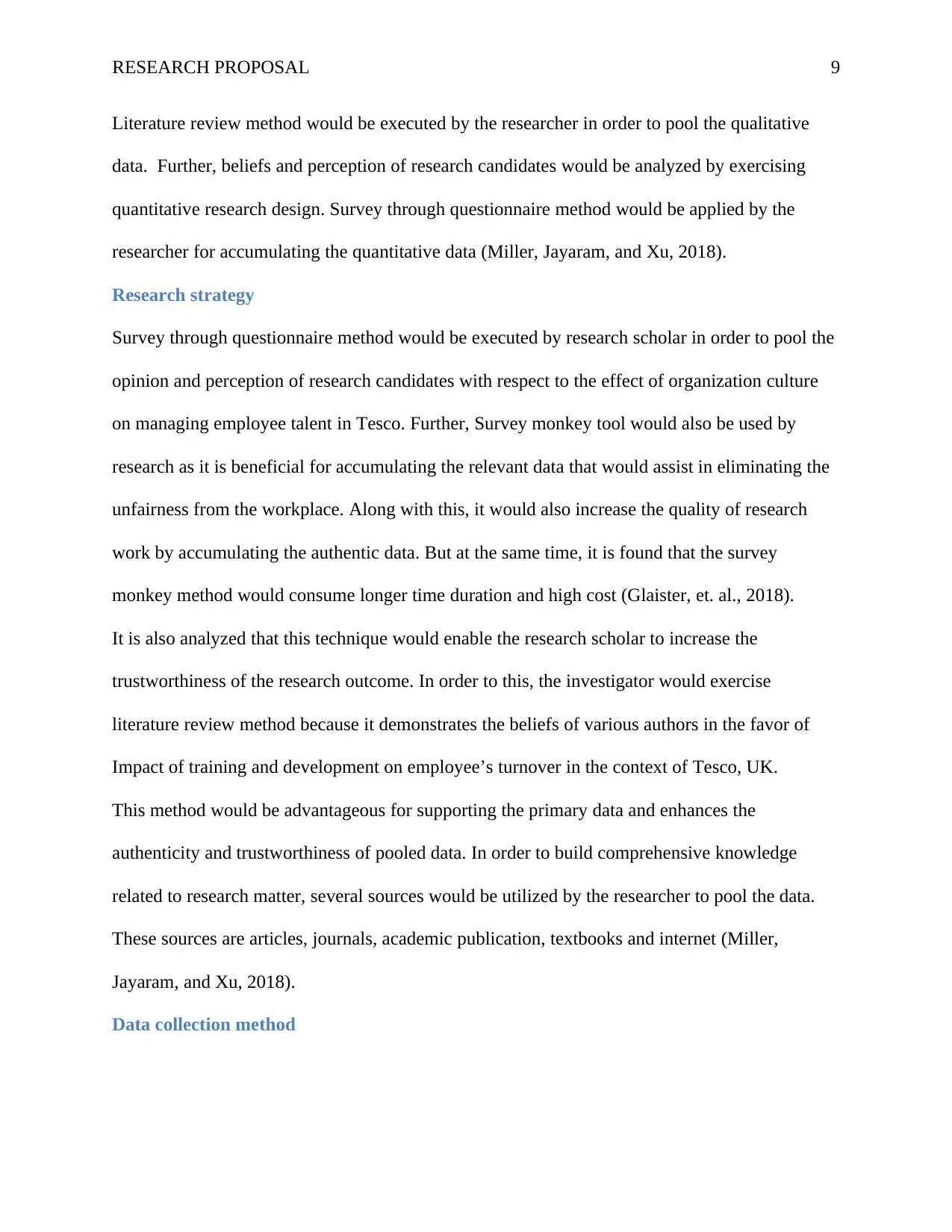
RESEARCH PROPOSAL 9
Literature review method would be executed by the researcher in order to pool the qualitative
data. Further, beliefs and perception of research candidates would be analyzed by exercising
quantitative research design. Survey through questionnaire method would be applied by the
researcher for accumulating the quantitative data (Miller, Jayaram, and Xu, 2018).
Research strategy
Survey through questionnaire method would be executed by research scholar in order to pool the
opinion and perception of research candidates with respect to the effect of organization culture
on managing employee talent in Tesco. Further, Survey monkey tool would also be used by
research as it is beneficial for accumulating the relevant data that would assist in eliminating the
unfairness from the workplace. Along with this, it would also increase the quality of research
work by accumulating the authentic data. But at the same time, it is found that the survey
monkey method would consume longer time duration and high cost (Glaister, et. al., 2018).
It is also analyzed that this technique would enable the research scholar to increase the
trustworthiness of the research outcome. In order to this, the investigator would exercise
literature review method because it demonstrates the beliefs of various authors in the favor of
Impact of training and development on employee’s turnover in the context of Tesco, UK.
This method would be advantageous for supporting the primary data and enhances the
authenticity and trustworthiness of pooled data. In order to build comprehensive knowledge
related to research matter, several sources would be utilized by the researcher to pool the data.
These sources are articles, journals, academic publication, textbooks and internet (Miller,
Jayaram, and Xu, 2018).
Data collection method
Literature review method would be executed by the researcher in order to pool the qualitative
data. Further, beliefs and perception of research candidates would be analyzed by exercising
quantitative research design. Survey through questionnaire method would be applied by the
researcher for accumulating the quantitative data (Miller, Jayaram, and Xu, 2018).
Research strategy
Survey through questionnaire method would be executed by research scholar in order to pool the
opinion and perception of research candidates with respect to the effect of organization culture
on managing employee talent in Tesco. Further, Survey monkey tool would also be used by
research as it is beneficial for accumulating the relevant data that would assist in eliminating the
unfairness from the workplace. Along with this, it would also increase the quality of research
work by accumulating the authentic data. But at the same time, it is found that the survey
monkey method would consume longer time duration and high cost (Glaister, et. al., 2018).
It is also analyzed that this technique would enable the research scholar to increase the
trustworthiness of the research outcome. In order to this, the investigator would exercise
literature review method because it demonstrates the beliefs of various authors in the favor of
Impact of training and development on employee’s turnover in the context of Tesco, UK.
This method would be advantageous for supporting the primary data and enhances the
authenticity and trustworthiness of pooled data. In order to build comprehensive knowledge
related to research matter, several sources would be utilized by the researcher to pool the data.
These sources are articles, journals, academic publication, textbooks and internet (Miller,
Jayaram, and Xu, 2018).
Data collection method
⊘ This is a preview!⊘
Do you want full access?
Subscribe today to unlock all pages.

Trusted by 1+ million students worldwide
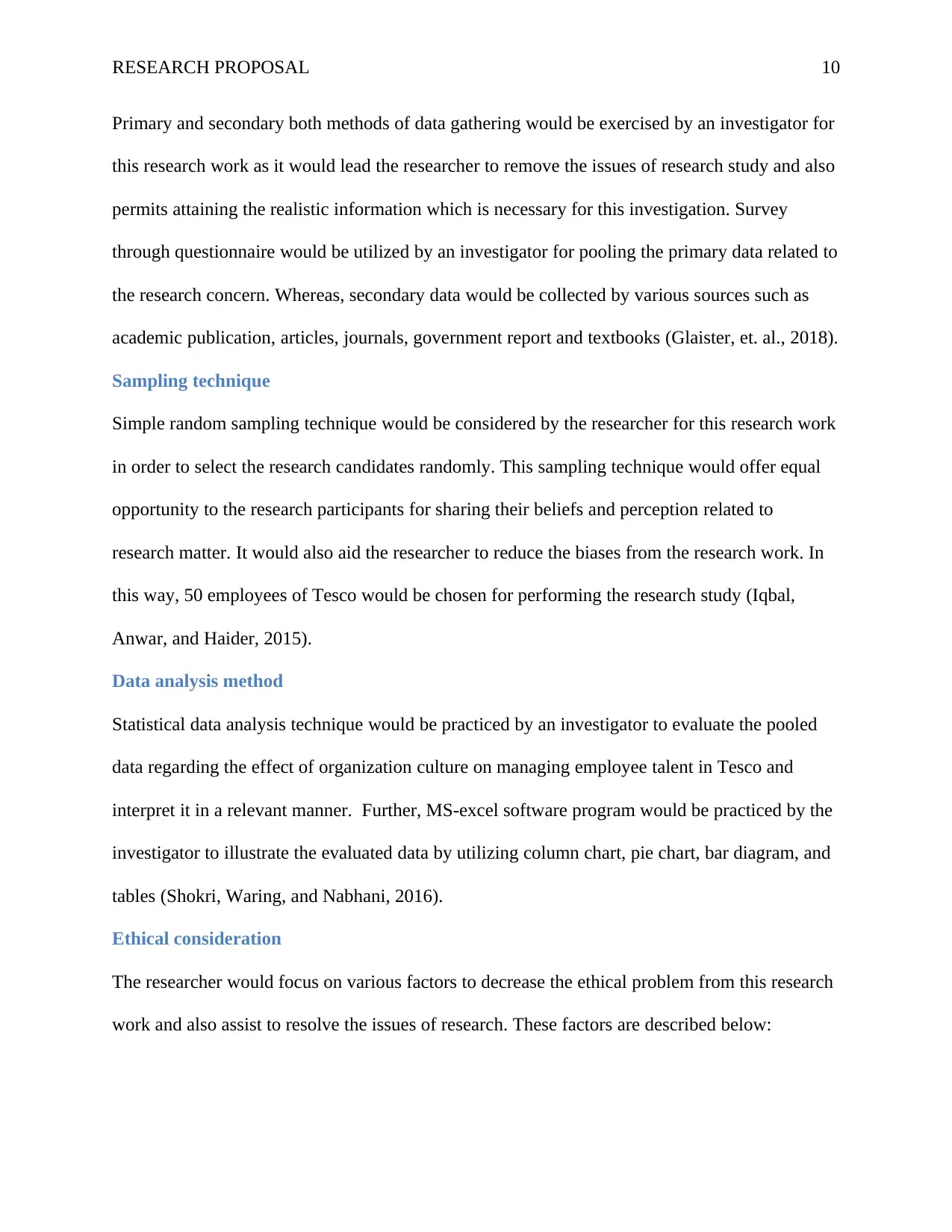
RESEARCH PROPOSAL 10
Primary and secondary both methods of data gathering would be exercised by an investigator for
this research work as it would lead the researcher to remove the issues of research study and also
permits attaining the realistic information which is necessary for this investigation. Survey
through questionnaire would be utilized by an investigator for pooling the primary data related to
the research concern. Whereas, secondary data would be collected by various sources such as
academic publication, articles, journals, government report and textbooks (Glaister, et. al., 2018).
Sampling technique
Simple random sampling technique would be considered by the researcher for this research work
in order to select the research candidates randomly. This sampling technique would offer equal
opportunity to the research participants for sharing their beliefs and perception related to
research matter. It would also aid the researcher to reduce the biases from the research work. In
this way, 50 employees of Tesco would be chosen for performing the research study (Iqbal,
Anwar, and Haider, 2015).
Data analysis method
Statistical data analysis technique would be practiced by an investigator to evaluate the pooled
data regarding the effect of organization culture on managing employee talent in Tesco and
interpret it in a relevant manner. Further, MS-excel software program would be practiced by the
investigator to illustrate the evaluated data by utilizing column chart, pie chart, bar diagram, and
tables (Shokri, Waring, and Nabhani, 2016).
Ethical consideration
The researcher would focus on various factors to decrease the ethical problem from this research
work and also assist to resolve the issues of research. These factors are described below:
Primary and secondary both methods of data gathering would be exercised by an investigator for
this research work as it would lead the researcher to remove the issues of research study and also
permits attaining the realistic information which is necessary for this investigation. Survey
through questionnaire would be utilized by an investigator for pooling the primary data related to
the research concern. Whereas, secondary data would be collected by various sources such as
academic publication, articles, journals, government report and textbooks (Glaister, et. al., 2018).
Sampling technique
Simple random sampling technique would be considered by the researcher for this research work
in order to select the research candidates randomly. This sampling technique would offer equal
opportunity to the research participants for sharing their beliefs and perception related to
research matter. It would also aid the researcher to reduce the biases from the research work. In
this way, 50 employees of Tesco would be chosen for performing the research study (Iqbal,
Anwar, and Haider, 2015).
Data analysis method
Statistical data analysis technique would be practiced by an investigator to evaluate the pooled
data regarding the effect of organization culture on managing employee talent in Tesco and
interpret it in a relevant manner. Further, MS-excel software program would be practiced by the
investigator to illustrate the evaluated data by utilizing column chart, pie chart, bar diagram, and
tables (Shokri, Waring, and Nabhani, 2016).
Ethical consideration
The researcher would focus on various factors to decrease the ethical problem from this research
work and also assist to resolve the issues of research. These factors are described below:
Paraphrase This Document
Need a fresh take? Get an instant paraphrase of this document with our AI Paraphraser
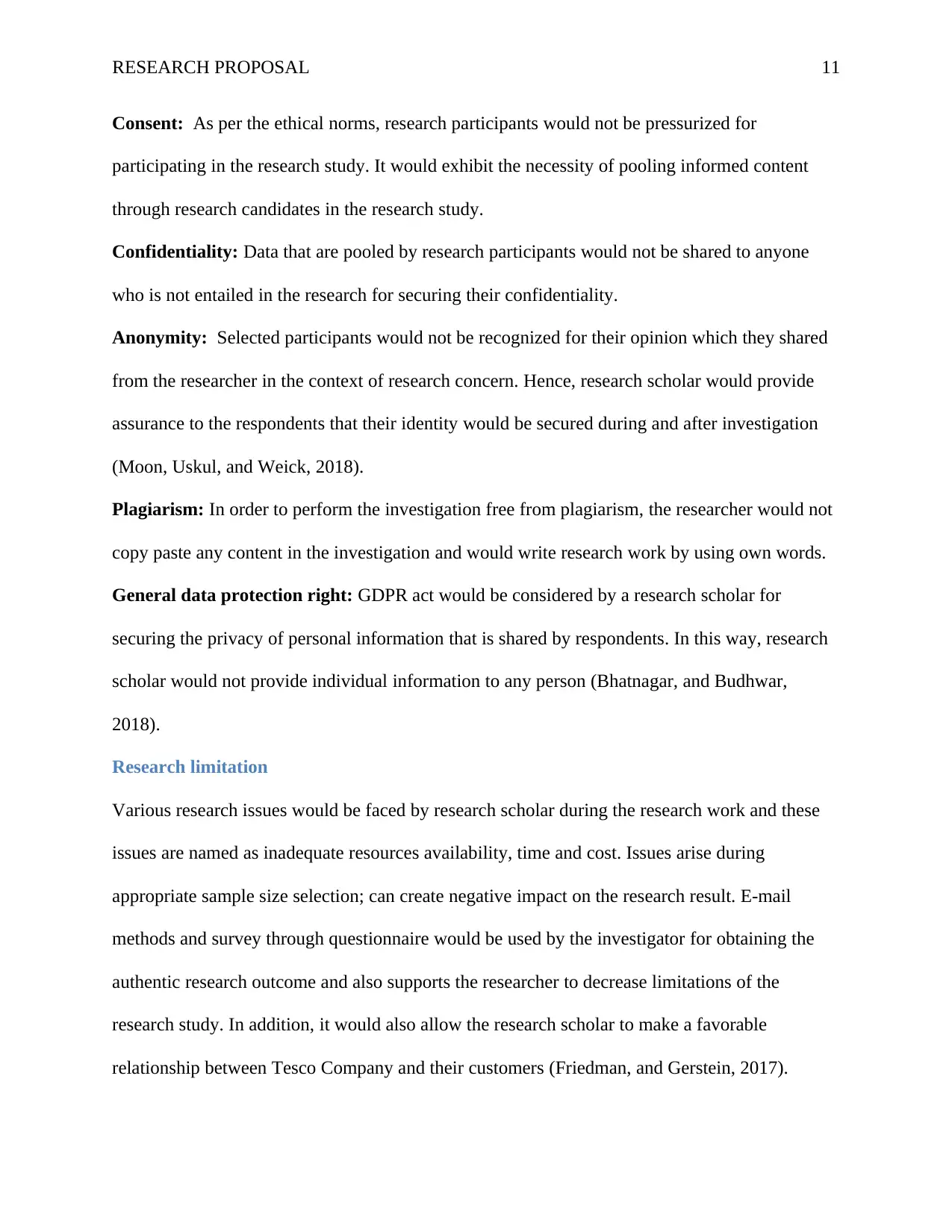
RESEARCH PROPOSAL 11
Consent: As per the ethical norms, research participants would not be pressurized for
participating in the research study. It would exhibit the necessity of pooling informed content
through research candidates in the research study.
Confidentiality: Data that are pooled by research participants would not be shared to anyone
who is not entailed in the research for securing their confidentiality.
Anonymity: Selected participants would not be recognized for their opinion which they shared
from the researcher in the context of research concern. Hence, research scholar would provide
assurance to the respondents that their identity would be secured during and after investigation
(Moon, Uskul, and Weick, 2018).
Plagiarism: In order to perform the investigation free from plagiarism, the researcher would not
copy paste any content in the investigation and would write research work by using own words.
General data protection right: GDPR act would be considered by a research scholar for
securing the privacy of personal information that is shared by respondents. In this way, research
scholar would not provide individual information to any person (Bhatnagar, and Budhwar,
2018).
Research limitation
Various research issues would be faced by research scholar during the research work and these
issues are named as inadequate resources availability, time and cost. Issues arise during
appropriate sample size selection; can create negative impact on the research result. E-mail
methods and survey through questionnaire would be used by the investigator for obtaining the
authentic research outcome and also supports the researcher to decrease limitations of the
research study. In addition, it would also allow the research scholar to make a favorable
relationship between Tesco Company and their customers (Friedman, and Gerstein, 2017).
Consent: As per the ethical norms, research participants would not be pressurized for
participating in the research study. It would exhibit the necessity of pooling informed content
through research candidates in the research study.
Confidentiality: Data that are pooled by research participants would not be shared to anyone
who is not entailed in the research for securing their confidentiality.
Anonymity: Selected participants would not be recognized for their opinion which they shared
from the researcher in the context of research concern. Hence, research scholar would provide
assurance to the respondents that their identity would be secured during and after investigation
(Moon, Uskul, and Weick, 2018).
Plagiarism: In order to perform the investigation free from plagiarism, the researcher would not
copy paste any content in the investigation and would write research work by using own words.
General data protection right: GDPR act would be considered by a research scholar for
securing the privacy of personal information that is shared by respondents. In this way, research
scholar would not provide individual information to any person (Bhatnagar, and Budhwar,
2018).
Research limitation
Various research issues would be faced by research scholar during the research work and these
issues are named as inadequate resources availability, time and cost. Issues arise during
appropriate sample size selection; can create negative impact on the research result. E-mail
methods and survey through questionnaire would be used by the investigator for obtaining the
authentic research outcome and also supports the researcher to decrease limitations of the
research study. In addition, it would also allow the research scholar to make a favorable
relationship between Tesco Company and their customers (Friedman, and Gerstein, 2017).
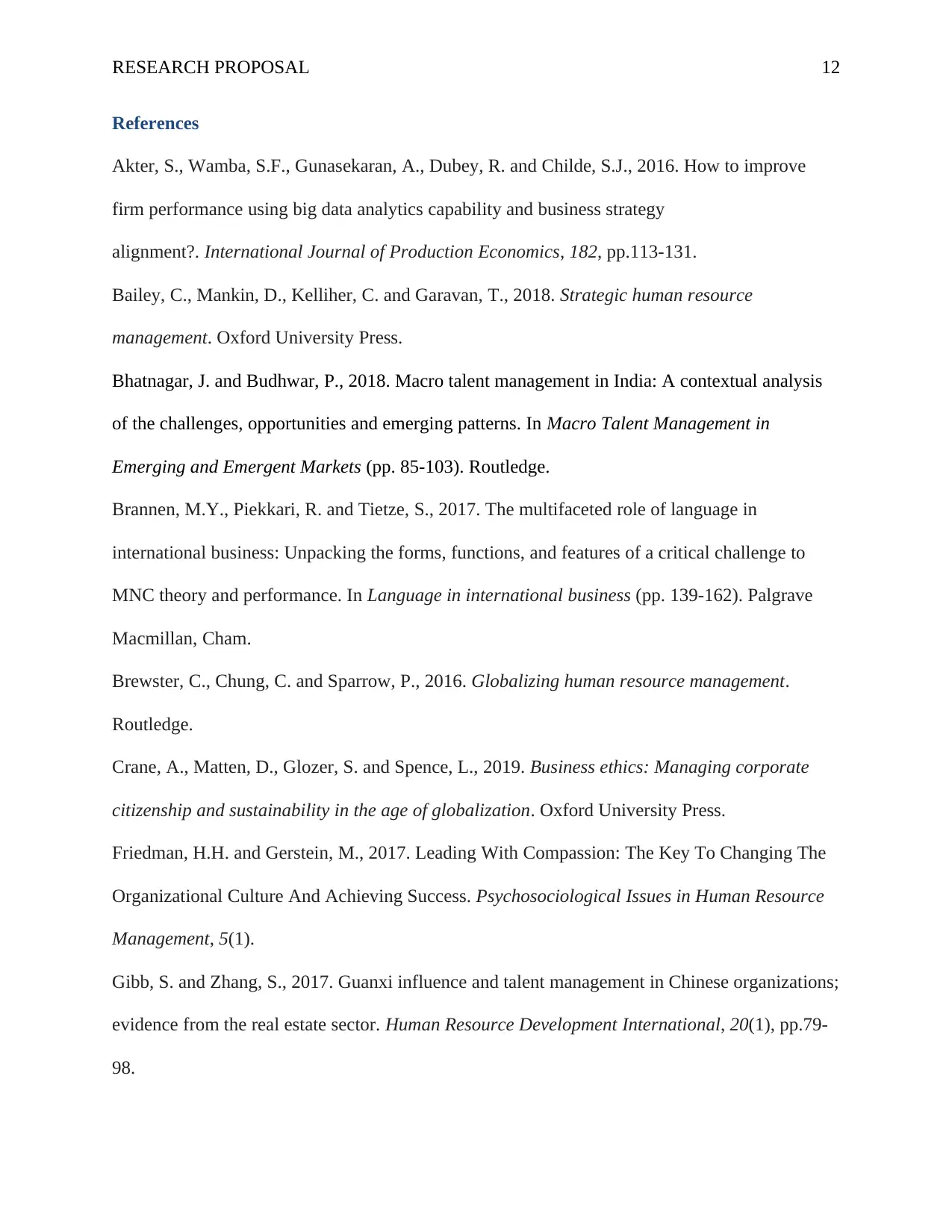
RESEARCH PROPOSAL 12
References
Akter, S., Wamba, S.F., Gunasekaran, A., Dubey, R. and Childe, S.J., 2016. How to improve
firm performance using big data analytics capability and business strategy
alignment?. International Journal of Production Economics, 182, pp.113-131.
Bailey, C., Mankin, D., Kelliher, C. and Garavan, T., 2018. Strategic human resource
management. Oxford University Press.
Bhatnagar, J. and Budhwar, P., 2018. Macro talent management in India: A contextual analysis
of the challenges, opportunities and emerging patterns. In Macro Talent Management in
Emerging and Emergent Markets (pp. 85-103). Routledge.
Brannen, M.Y., Piekkari, R. and Tietze, S., 2017. The multifaceted role of language in
international business: Unpacking the forms, functions, and features of a critical challenge to
MNC theory and performance. In Language in international business (pp. 139-162). Palgrave
Macmillan, Cham.
Brewster, C., Chung, C. and Sparrow, P., 2016. Globalizing human resource management.
Routledge.
Crane, A., Matten, D., Glozer, S. and Spence, L., 2019. Business ethics: Managing corporate
citizenship and sustainability in the age of globalization. Oxford University Press.
Friedman, H.H. and Gerstein, M., 2017. Leading With Compassion: The Key To Changing The
Organizational Culture And Achieving Success. Psychosociological Issues in Human Resource
Management, 5(1).
Gibb, S. and Zhang, S., 2017. Guanxi influence and talent management in Chinese organizations;
evidence from the real estate sector. Human Resource Development International, 20(1), pp.79-
98.
References
Akter, S., Wamba, S.F., Gunasekaran, A., Dubey, R. and Childe, S.J., 2016. How to improve
firm performance using big data analytics capability and business strategy
alignment?. International Journal of Production Economics, 182, pp.113-131.
Bailey, C., Mankin, D., Kelliher, C. and Garavan, T., 2018. Strategic human resource
management. Oxford University Press.
Bhatnagar, J. and Budhwar, P., 2018. Macro talent management in India: A contextual analysis
of the challenges, opportunities and emerging patterns. In Macro Talent Management in
Emerging and Emergent Markets (pp. 85-103). Routledge.
Brannen, M.Y., Piekkari, R. and Tietze, S., 2017. The multifaceted role of language in
international business: Unpacking the forms, functions, and features of a critical challenge to
MNC theory and performance. In Language in international business (pp. 139-162). Palgrave
Macmillan, Cham.
Brewster, C., Chung, C. and Sparrow, P., 2016. Globalizing human resource management.
Routledge.
Crane, A., Matten, D., Glozer, S. and Spence, L., 2019. Business ethics: Managing corporate
citizenship and sustainability in the age of globalization. Oxford University Press.
Friedman, H.H. and Gerstein, M., 2017. Leading With Compassion: The Key To Changing The
Organizational Culture And Achieving Success. Psychosociological Issues in Human Resource
Management, 5(1).
Gibb, S. and Zhang, S., 2017. Guanxi influence and talent management in Chinese organizations;
evidence from the real estate sector. Human Resource Development International, 20(1), pp.79-
98.
⊘ This is a preview!⊘
Do you want full access?
Subscribe today to unlock all pages.

Trusted by 1+ million students worldwide
1 out of 14
Related Documents
Your All-in-One AI-Powered Toolkit for Academic Success.
+13062052269
info@desklib.com
Available 24*7 on WhatsApp / Email
![[object Object]](/_next/static/media/star-bottom.7253800d.svg)
Unlock your academic potential
Copyright © 2020–2025 A2Z Services. All Rights Reserved. Developed and managed by ZUCOL.





